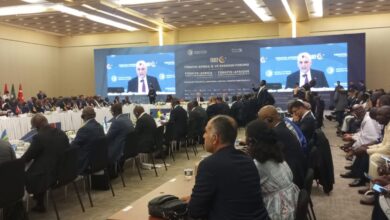As Prime Minister Hesham Qandil was unveiling the new Cabinet, unrest ensued in parts of the country.
One person died outside Cairo’s Nile City towers in violence between the complex and the slum behind it, clashes between Muslims and Christians continued near the Pyramids, railway workers have been striking and protests took place in Upper Egypt against power cuts amid the oppressive summer heat. It is a backdrop that tells of some of the challenges that lie ahead for the new government.
Those looking for new faces and fresh thinking would have been disappointed by appointments made in the Cabinet’s economic portfolios, which instead represent a continuation of policies seen over the last few months. Others may feel comforted by the choice of experienced technocrats taking over key portfolios.
Some of these include Finance Minister Momtaz al-Saeed, who was appointed by the military last December; Investment Minister Osama Saleh, who is the former head of the General Authority for Investment; Planning and International Cooperation Minister Ashraf al-Arabi, a former chairman of the Egyptian Tax Authority; and Hatem Saleh, a wealthy businessmen who has taken over the Ministry of Trade and Industry.
Hassan Malek, head of the Egyptian Business Development Association, was unimpressed by the lack of change.
“The government needs new faces and stronger economic experts to lead the coming period, which is going to be very difficult,” he told Egypt Independent in a telephone interview.
Malek, also a member of the Muslim Brotherhood, has been looked to by President Mohamed Morsy to liaise between the government and private sector investors. His comments suggest that the appointments may not ease investors’ concerns.
While the government may have been looking to avoid any major surprises in the appointments, there is also a risk in too little change.
Jane Kinninmont, a senior research fellow of the Middle East and North Africa at the UK-based think tank Chatham House, said there is some recognition among investors of the need for change in economic policies to address socio-economic grievances that contributed to political risk.
“It is not clear that the new ministers will have a particularly creative or innovative approach to Egypt’s complex economic challenges,” she added.
The choices may be intended to “reassure investors that there will be no U-turn in terms of Egypt’s openness to business,” she said.
The Egyptian stock market reacted well to the appointments. The EGX-30 index closed up 1.5 per cent and Egypt’s dollar-denominated bond yields remained stable.
“This is perhaps a reflection of the fact that there were no surprises in the new government, rather than a vote of confidence,” Capital Economics, a London-based consultancy, said in a 2 August statement.
Osama Mourad, head of the Arab Finance Brokerage, which is an indirect subsidiary of Orascom Telecom, said the appointments lacked new faces because the Muslim Brotherhood couldn’t draw anyone from their own ranks to handle the economy.
“My previous view was that they did not want to hold whole responsibility, but now from what I have seen, they may not have the capable people that they think they have,” he said.
Another reason for the lack of change is that many people turned down positions in the new government.
Qandil had attempted to appoint a deputy prime minister for economic affairs to manage the three ministries, but this idea was cancelled, he said, because of an inability to find a consensus figure to coordinate among them.
In the lead up to the Cabinet announcement, local media suggested Qandil was finding it difficult to recruit ministers for the economic team because of the government’s weak mandate and powers.
Those approached said they would only accept the position on the condition that they would be given complete freedom to implement market policies, rather than be forced to subscribe to a specific project, like the president’s Islamist Renaissance project, Al-Shorouk newspaper said on 30 July.
An unnamed key financial figure was quoted by the paper following a meeting with Qandil, explaining his refusal of an economic position in government. “The picture is vague and mandates unclear for the prime minister and president, so what do you think will be the case for ministers?” he asked rhetorically.
Samer Soliman, associate professor of political economy at the American University in Cairo, said that many people would have been turned off by the weakness of the government.
“Some would have declined positions because they don’t want to participate in a Brotherhood government. But, also, the prime minister is a weak figure. This doesn’t encourage anyone to enter the ministry,” he said.
The Cabinet’s decisions are weakened by the fact that the army maintains veto power over legislation. A new constitution that defines the powers of various arms of government still has to be written, and its writers have yet to overcome their differences. The People’s Assembly, the only elected institution since the 25 January revolution, remains dissolved.
So Qandil, a former irrigation minister who worked at the African Development Bank, will lead the economic team instead. Their first meeting to set economic priorities is scheduled for Saturday, 4 August.
One of the pressing economic issues ahead of the new Cabinet is the budget support loan of $3.2 billion (LE19.4 billion) Egypt has been trying to negotiate with the International Monetary Fund for the last year and a half.
It is a small amount relative to the size of the deficit but investors see the loan, which would be accompanied by a reform plan, as a stamp of approval that Egypt is on the right path. This would encourage further investment flows into the country needed to shore up a weak economy.
But as a condition, the IMF has said the loan and reform program need broad political support, which include parliamentary approval. It remains unclear whether or not Cabinet and army approval alone will be enough for the IMF to agree to its dispersal. Sources within the IMF have suggested to Egypt Independent that it won’t be.
Failing this, those leading the economy will need to find a way to deal with the government’s illiquid finances, while meeting people’s basic demands for jobs and higher wages.
In the fiscal year that began on 1 July, the budget deficit is expected to rise 12.5 percent to reach LE135 billion. Internal debt is at LE1.8 trillion, Qandil said, up from LE888 billion in May 2011, and external debt amounts to US$33.8 billion, down from US$35 billion last year. With foreign reserves reaching critically weak levels, currency devaluation is also an increasingly looming prospect.
“Time is running out to salvage the ailing economy and to prevent a full-blown crisis,” Capital Economics said.




